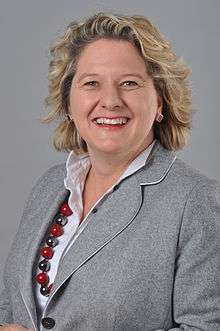Svenja Schulze
Svenja Schulze (born 29 September 1968) is a German politician of the Social Democratic Party (SPD) from Münster in Westphalia.[1]
Svenja Schulze | |
|---|---|
 | |
| Minister of the Environment, Nature Conservation and Nuclear Safety | |
| Assumed office 14 March 2018 | |
| Chancellor | Angela Merkel |
| Preceded by | Barbara Hendricks |
| Personal details | |
| Born | 29 September 1968 Düsseldorf, West Germany (now Germany) |
| Political party | Social Democratic Party |
| Alma mater | Ruhr-Universität Bochum |
Schulze currently serves as Minister of the Environment, Nature Conservation and Nuclear Safety in the fourth coalition government of Chancellor Angela Merkel. From 15 July 2010 to 30 June 2017, she was State Minister of Innovation, Science and Research of the State North Rhine-Westphalia.[1]
Early life and career
Schulze was born in Düsseldorf. She completed her school-leaving exam in 1988 at the Gymnasium Norf in Neuss. She then studied German Studies and Political Science at Ruhr-Universität Bochum, which she completed in 1996 with the academic degree of Magistra Artium. Afterwards, she worked as a freelancer in the advertising and PR industry.[1] From 2000, she worked as a management consultant specializing in the public sector, including at Mummert & Partner, BBDO and Booz & Company.
Political career
Schulze joined the SPD in 1988 and served as county spokesperson for North Rhine-Westphalia from 1988 to 1989, then as a member of the Socialist College Association and chair of the AStA at the University of Bochum. As part of her studies, she also did an internship at Alice-Salomon-Berufskolleg (Bochum). From 1993 to 1997, Schulze was North Rhine-Westphalia's regional leader of Jusos, from 1996 to 2002, and since 2006 she has been a member of the North Rhine-Westphalian board of her party.[1]
Career in state politics
From 3 June 1997 to 1 June 2000, and from 22 October 2004, Schulze was member of the Landtag of North Rhine-Westphalia.[1] She last moved in for Frank Baranowski, who had been elected Lord Mayor of Gelsenkirchen. In the 2005 and 2010 elections she was again elected to the state parliament.[1] At the election on 13 May 2012, she won the direct mandate in the Münster II constituency and was directly elected to the state legislature with 40.1 percent. In 2007, Schulze took over the chairmanship of the SPD sub-district Münster from Christoph Strässer and held it until 21 May 2011.
After 2010 state elections, Minister-President Hannelore Kraft appointed Schulze as State Minister of Innovation, Science and Research of the State of North Rhine-Westphalia (Cabinet Kraft I). With the abolition of tuition fees in North Rhine-Westphalia, Schulze launched one of the government's major political projects. During her term, the so-called "nuclear sphere affair" regarding the AVR reactor in Jülich occurred. On 21 June 2012, she was appointed again as State Minister of Innovation, Science and Research in the Cabinet Kraft II.
From 2017 until 2018, Schulze served as Secretary General of the SPD North Rhine-Westphalia, in this capacity supporting interim chairman Michael Groschek.[2] On 8 December 2017, Schulze was elected to the SPD national board, under the leadership of chairwoman Andrea Nahles.[3] On the following day she was also elected to the SPD Presidium.[4]
Federal Minister of the Environment, 2018–present
In the negotiations to form a fourth coalition government under Chancellor Angela Merkel following the 2017 federal elections, Schulze was part of the working group on education policy, led by Annegret Kramp-Karrenbauer, Stefan Müller and Hubertus Heil. On 9 March 2018, she was nominated by the party executive committee of the SPD as Minister of the Environment, Nature Conservation and Nuclear Safety in the new government.[5]
Other activities
Corporate boards
Non-profit organizations
- ZDF, Member of the Program Committee (since 2019)[7]
- German Research Foundation (DFG), Member of the Joint Committee (2010-2017)
- Max Planck Society, Member of the Senate (2010-2017)
- Heinrich Hertz Foundation, Chairwoman of the Board of Trustees (2010-2017)
- North Rhine-Westphalian Academy of Sciences, Humanities and the Arts, Deputy Chairwoman of the Board of Trustees (2010-2017)
- German United Services Trade Union (ver.di), Member[1]
- IG Bergbau, Chemie, Energie (IG BCE), Member[1]
- Arbeiterwohlfahrt, Member
- Naturschutzbund Deutschland (NABU), Member
- Slow Food, Member
- "Frauenzeiten", Co-Founder
References
- Abgeordnete Svenja Schulze, landtag.nrw.de
- NRW: SPD wählt Michael Groschek zum Landesparteichef, Die Zeit
- Wahlergebnisse Parteivorstand 2017, SPD.de
- BeisitzerInnen des SPD-Präsidiums gewählt, SPD.de
- Unser Team, SPD.de
- Board of Supervisory Directors and its Committees KfW.
- Members of the Program Committee ZDF.